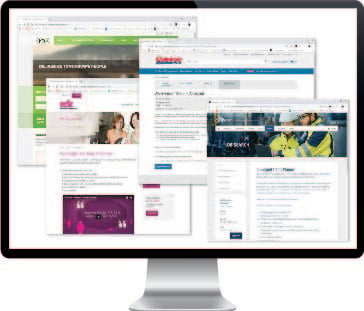By 2020 it's predicted that Millennials will make up 35% of the global workforce, whilst the even younger 'Gen Z' group will make up 24%. With little over 16 months until the statistics becomes reality it's never been more important to attract and recruit younger talent to the business.
To help you understand the mindset of a millennial we've compiled 5 key statistics on their behaviour and how to utilise social media to attract younger talent.
Millennials:
Born between the early-1980s and the mid-1990s, the Millennial generation are the latest batch of employees making that sometimes turbulent transition from education to employment. The Millennials have a lot to offer today's employers... including a very particular idea about what a good job should entail. The following statistics should act as a guiding light to help employers work out how best to attract Millennials... remember, they will be paying towards our pensions one day(!)
47% of Millennials prefer working with SMEs compared to 19% preferring larger companies – Millennials are flocking to SMEs, seeking out a social environment to work environment with its own rulebook and the chance to make a difference. Larger companies should take note of the opportunities SMEs offer the demographic and what more they can do to reel them in.
By 2025, Millennials will make up an estimated 75% of the global workforce – As the years go by, we’re going to become increasingly dependent on Millennials, from training them to managing them, preparing them and finally being managed by them. Our economy is going to depend on how well-equipped people are to become captains of industry. After all, someone’s going have to pay towards our pensions!
43% of Millennials plan to leave their jobs within two years – Another recurring trend with Millennials is job dissatisfaction. The generation is all about career progression, they want to make a difference in their line of work. If you can't guarantee promotion after promotion don't worry it's not the only thing that Millennials want...
85% of Millennials would prefer to work from home rather than a traditional office environment – Millennials like flexibility, they’re none too fond of being boxed in to the atypical 9-5 office environment. If anything, this can do wonders for their productivity.
Did you know that 35% of Millennials started their own business on the side for additional income? When full-time work isn’t always available to some people (partially because some employers expect newcomers to be 20 going on 40), they bring in their own money through creative means, an innovative flair that all employers should try leaping on and integrating into their own businesses.
Social Media:
A decade ago who'd of thought we'd be using the likes of Facebook to source candidates. Social media now has a lot more to offer than just funny cat videos. Below are a few stats to emphasise why Facebook, Twitter and Linkedin are some of the driving forces in the recruitment process.
73% of 18-34-year olds found their last job through a social network – It’s hard to believe that dreams are not coming true on the likes of Indeed and Total Jobs, but the devil is in the details (or, in this case, a Facebook page).
22% of applicants check out their interviewer's social media - don't be alarmed, they're just trying to get a sense of what type of work environment to expect, you don't have to worry about receiving locks of hair in the post!)
85% believe that CEOs can use social media channels to improve engagement with employees – You'd be hard-pressed to find an employee who isn’t on Facebook, Twitter or some other social media platform. For industries that struggle with internal communication, Messenger can be the only thing keeping people interlinked.
59% of employers believe that employee involvement in recruitment via social media will damage rather than enhance the employer brand – Unfortunately, some employers aren’t entirely won over by the idea of social media as a recruitment tool, but hopefully this will change in time for the following reason...
82% of people are more likely to trust a company whose leadership team engages with social media – Reputation can take a lifetime to build... but most companies don’t have a lifetime to recruit new staff. You can speed up the trust building a lot quicker if social media is used to forward the brand.
Attract more talent wit a high performing career page


